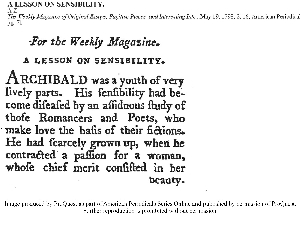 ―71― ―71―
For the Weekly Magazine.
a lesson on sensibility.
ARCHIBALD was a youth of very
lively parts. His sensibility had be-
come diseased by an assiduous study of
those Romancers and Poets, who
make love the basis of their fictions.
He had scarcely grown up, when he
contracted a passion for a woman,
whose chief merit consisted in her
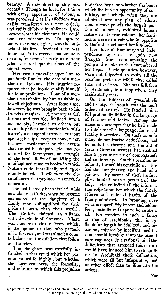 ―72― ―72―
beauty. A new object quickly suc-
ceeded: Though he loved for a time
with every appearance of ardour, it
was perceived that his affections were
easily transferred to a new object,
and easily dissolved by absence. Love
however, was his element: He could
not exist without it. To sigh, to
muse, to frame elegies, was the busi-
ness of his life. Provided there was
some object to receive his amorous
devoirs, it seemed nearly indifferent
what the real qualifications of the
object were.
His friends prevailed upon him to
put himself under the care of a mer-
chant in Ireland. His situation re-
quired that he should qualify himself
for some profession. That of a mer-
chant was chosen by him as liable to
fewest objections. After some time,
however, he was brought back to his
friends a maniac. A phrenzy at first
furious and terrible, subsided into a
melancholy, harmless to others, but
invincibly silent and motionless, with
scarcely a change of attitude; without
opening his lips except to converse on
his own misfortunes or the events
that caused his despair. He has re-
mained for some years, an example
of the fatal effects of addicting the
undisciplined mind to books, in which
Nature is so fantastically and egre-
giously belied. These were the cir-
cumstances that produced an effect so
mournful.
He had scarcely been settled in his
new abode at Corke, when he became
enamoured of the daughter of a
family more distinguished for their
pride of birth, than their wealth.
The Butlers claimed an alliance
with the House of Ormond. There
was honour in this descent, which,
in the opinion of those who partook
of it, survived, and was almost a coun-
terbalance to the disasters that follow
an attainder.
The daughter was carefully in-
structed in that creed which her par-
ents valued so highly; but whether
the inconveniences, the formality,
and restraint to which this prejudice
subjected her; or whether the books
which she had an opportunity of con-
sulting, and which, when they are
admitted into any plan of educa-
tion, always possess the largest por-
tion of influence, exhibited human
nature in its true colours, her senti-
ments were of a cast wholly opposite
to those that actuated her kindred.
Her love of simplicity and inde-
pendence appeared to gain new
strength from contemplating the
pomp and indolence that encumbered
her steps. These qualities, however,
were not suspected to exist, till the
occasion presented itself, that called
them into action. She was first seen
by Archibald, in a shop where they
accidentally met.
On the subjects of gracefulness
and beauty, the youth was the most
ardent of critics. He fancied him-
self profoundly skilled in the language
of features and looks. Among the
numerous attempts that he had made
to interpret this language, some had
luckily succeeded. On these as on so
many demonstrative deductions, had
he built his theory; and the aid of
certain German writers, had enabled
him to give it an air of completeness
and consistency. On this occasion he
instantly formed his conclusions. He
had the imagination and hand of a
painter. By means of these he sup-
plied himself with a portrait of the
lady. He collected all the informa-
tion respecting her which the stately
reserve and unsocial habits of the
family admitted. In brooding over
what is imperfectly known and seldom
seen, enthusiasm is apt to be awaken-
ed. No wonder, in such a fancy
as that of Archibald, this image
should at length be idolized, and his
passion, fostered by incessant medita-
tion, should break out into the utmost
extravagances. In a rational mind the
difficulties that attended this pursuit
would have induced him to relinquish
it: In Archibald those difficulties,
which were all but insuperable, had
no other effect than to stimulate his
ardour.
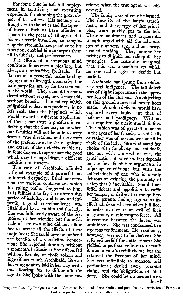 ―73― ―73―
For some time he had full employ-
ment in contriving and executing
expedients for obtaining the great ob-
ject of his wishes. His memory was
fraught with the wiles and stratagems
of lovers; such as have afforded a
theme to the poets of all ages: But
his own fertile invention, contempla-
ting the circumstances peculiar to his
situation, enabled him to surpass them
all in subtlety and perservance.
The efforts of a strenuous mind
constitute sometimes a pleasing, but
always an instructive spectacle. In
stances of a powerful understanding
laying out its strength upon trivial or
base purposes, are by far too common
in the world. They cannot be consi-
dered without regret, nor, I may add,
without benefit. The misery which
misguided endeavours produce, is no
less real, than the happiness which
would reward a different application
of them; but there is pleasure in re-
flecting that the time may come when
our faculties will not be able to vary
from a true direction, and the errors
of the present race, by the magnitude
and extent of their effects, enable us,
in some degree, to appreciate the good
which may be hoped from a different
condition of society.
The case of Archibald afforded
a signal example of a powerful but
misdirected capacity. I shall not men-
tion the various contrivances which
his ruling passion suggested to him.
It is sufficient to say that after a due
period of industry, and hope, and sus-
pense, a good correspondence was
established between him and the lady.
She was sufficiently aware of the pre-
judices of her friends; but the recti-
tude of her own mind did not allow
her to foresee all the effects of their
prejudices: She could never apprehend
the benefits of a clandestine connec-
tion: She rejected disguise, without
a moment's hesitation: She discoursed
without scruple, on those tokens and
suggestions which Archibald, like an
hovering genius, laid in her way with-
out allowing her to distinguish the
agent: She spoke with the same un-
reserve when the true agent was dis-
covered.
The family were of course alarmed.
The sincerity of the lady's attach-
ment, and the energy of her princi-
ples, were quickly put to the test.
Their remonstrances and arguments,
though urged with all the advanta-
ges of numbers, age, and authority,
availed nothing. They taught her
neither to disguise nor relinquish her
principles. She naturally imagined
that this was a question on which
no one had a right to decide but
herself.
Archibald had sprung from obscu-
rity and indigence. The last defect
was of slight importance in the appre-
hension of the Butlers. An objection
on this ground alone had never been
made. A noble descent would have
expiated every fault, but that of
baseness and profligacy. Without
this requisite no merit would suffice.
That which was of greatest moment
in the eyes of her friends, was of least,
or rather was of no moment at all in
those of the lady. She vindicated her
choice with simplicity and mildness,
and not with the zeal of one, the
gratification of whose wishes depends
on the success of her arguments in
inspiring conviction; but with the
collectedness of one who is merely
desirous of evincing the propriety of
a step that is inevitable. She did not
suffer debate and opposition to ruffle
her temper, or destroy her tranquility.
Her parents finding arguments in-
effectual, deemed themselves justified,
in order to obviate an evil of such
magnitude, in resorting to force. All
intercourse between the lovers was
prohibited. She was condemned to a
rigorous confinement. Her constancy,
however, was not to be shaken: She
reserved herself for better times: She
yielded to personal restraints, because
it was in vain to resist them; but she
retained the freedom of her mind.
She was insensible to menaces and
persuasions; denied every parental
claim, and the obligations of filial
duty. She could by no means be in-
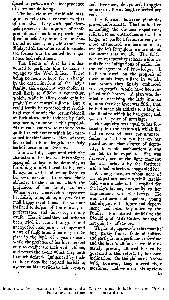 ―74― ―74―
duced to part with the independence
of a reasonable being.
The behaviour of Archibald was,
in many respects, a contrast to that
of the lady. They with equal clear-
ness perceived the injustice of those
pretensions of her family; with equal
strenuousness they refused to be con-
trolled by them; but, while the latter
displayed all the calmness of fortitude,
the former was tormented by impa-
tience and resentment.
The friends of Archibald endea-
voured to persuade him to make a
voyage to the West Indies. There
being no room to hope for a change
in the determinations of the lady's
family, this expedient was chosen as
most likely to dissolve a connection
which, while it lasted, could only be
productive of mutual distress. But it
could hardly be expected that Archi-
bald would admit the reasonableness
of such ideas, or be induced by such
arguments, to embrace this proposal.
Many endeavours were made to van-
quish the reluctance which he enter-
tained for this scheme. None of them
succeeded, till at length, the lady
herself became its advocate.
She was fully acquainted with the
character of her lover. His absence
appeared to her to be desirable, as
furnishing a useful trial to his con-
stancy, as well as allowing scope to
her own exertions to remove those
obstacles to their union, which the
prejudices of her family created.
When every conceivable expedient
has failed, time, alone, may work the
most happy revolutions. She was not
inclined to despair of the efficacy of
perserverance and sincerity, in any
cause. Here indeed they had hitherto
been tried in vain; but great and
unexpected changes in the temper and
views of those around her might take
place in the lapse of a year: mean-
while the presence of her lover tended
only to exasperate their evil passions,
and retard the event which they both
so much desired. Influenced by these
considerations she exerted herself to
overcome his aversion to this voyage,
and after many delays and struggles
on his part, she at length effected her
end.
The scheme, however plausible,
proved unfortunate. The family after
exhausting the obvious expedients,
resorted to more attrocious ones. The
longer we pursue a favourite end, the
more enamoured we become of it,
and the less scrupulous we are about
the means that we use. The strict-
ness of our morality relaxes while we
mistake the instigations of passion for
the enlargement of knowledge. I
shall not dwell on the progress of
their minds from a state in which,
that which they finally embraced
with eagerness, would have been re-
jected with horror. A plan was de-
vised of deceiving the lady into an
opinion that her lover was false; that
he had made his address to a lady in
the island to which he had gone, and
was on the point of marriage.
Her sagacity was equal to her for-
titude; but the craft with which she
had to contend was consummate.
Suspicion had not put her on her
guard against that degree of depra-
vity, to whose machinations it was
her lot to be exposed. She was
deceived, and at the same moment
she was forsaken by the fortitude
which had hitherto accompanied her.
A young man, to whom none of
the objections made against Archi-
bald were incident, had applied for
the lady's favour, previously to her
acquaintance with the latter. He
was well-born and opulent, young
and elegant in his figure and deport-
ment, and intimately allied to the
family. He entitled himself to the
friendship of Miss Butler, but could
not gain her affections.
The family approved of this match;
but, partly from a sense of justice,
and partly from a persuasion that time
and the lover's assiduities would ulti-
mately prevail, allowed her to be
governed in this respect by her own
inclination. On the claims of Archi-
bald, however, they altered their
measures, and were no less anxious
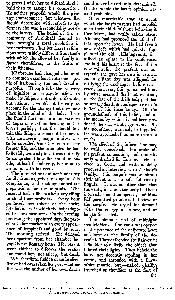 ―75― ―75―
to prevail with her to discard Archi-
bald than to accept his competitor.
To neither proposal would she give
any countenance; but whatever she
should determine with respect to the
former, she was irreconcilably averse
to the latter. The belief of the in-
constancy of Archibald seemed to
have wrought a total revolution in
her sentiments; but her secret resolu-
tions were widely different from
those with which she allowed her family to
flatter themselves, as the fruits of
their schemes.
Misfortune had changed a being of
no common excellence into one capa-
ble of harbouring the most dreadful
purposes. Though it be the property
of injustice to propagate itself, to
make its subjects not only miserable,
but vicious, it would not be easy to
account for the change that now took
place in the mind of this lady. That
she should start out into no excesses
of anger or grief on hearing of her
lover's perfidy; that she should sus-
tain this disappointment of her hopes,
with unwavering magnanimity, was
to be expected from the tenor of her
former life, and the principles she had
so steadily avowed; but it was not easy
to comprehend how she could recon-
cile, at least so suddenly, her mind to
an union with his rival.
These reflections did not hinder her
family from eagerly profiting by this
compliance, and making immediate
preparations for the nuptials. The
interval had passed without any thing
to cloud their prospect. Every hour
produced new tokens of the entire
satisfaction with which the lady adopt-
ed her new measures. On the evening
preceding the appointed day, she part-
ed with her mother with every appear-
ance of happiness and good humour.
The morning arrived. She delayed
her departure from her chamber be-
yond her customary hour. Her parent
went thither to discover the reason
and found her, not asleep, but dead.
Whether some sudden or unforeseen
stroke had overtaken her; or, whether
she was the author of her own death
could never be certainly determined.
On the whole the latter opinion was
most probable.
It is remarkable that an event
which the lady's parents had imposed
upon their child, without believing it
themselves, had really taken place.
Absence had produced the usual ef-
fect upon the lover. He had seen a
new object which had quickly sup-
planted the old. His ingenuity fur-
nished an opiate to his conscience.
He laid his heart at the feet of the
new mistress; the present was ac-
cepted; she gave her own in return;
and a distant day was assigned for
ratifying the exchange: before it ar-
rived, however, tidings reached him,
by what means I shall not mention,
of the fate of the Irish lady; of her
voluntary death in consequence of the
belief of his inconstancy. Of the
groundlessness of this belief, and of
the means by which it had been pro-
duced, he was wholly ignorant. As
his inconstancy was real, he supposed
she was apprized of no more than the
truth.
The effect of this information may
be easily conceived. He broke off
his present connection, and immedi-
ately embarked for Europe. He ar-
rived at Cork, and without delay
procured an interview with the lady's
family. His purpose was to obtain
their assent to a proposal sufficiently
singular—It was no other than that
the vault, in which the body had been
interred, should be opened, and him-
self permitted to take a last view of
the corpse. He urged his demand
with the energy of frenzy, and at
length succeeded.
The solemn period of midnight
was selected. The vault was opened
in the presence of the desperate lover
and some of the family of the de-
ceased. They descended the stair-case:
I shudder to describe the object that
saluted their sight. They beheld the
lady, not decently reposing in her
coffin, and shrouded with a snow-
white mantle, but, —naked, ghastly,
stretched on the floor at the foot of
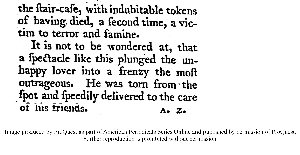 ―76― ―76―
the stair-case, with indubitable tokens
of having died, a second time, a vic-
tim to terror and famine.
It is not to be wondered at, that
a spectacle like this plunged the un-
happy lover into a frenzy the most
outrageous. He was torn from the
spot and speedily delivered to the care
of his friends.
a. z.
|